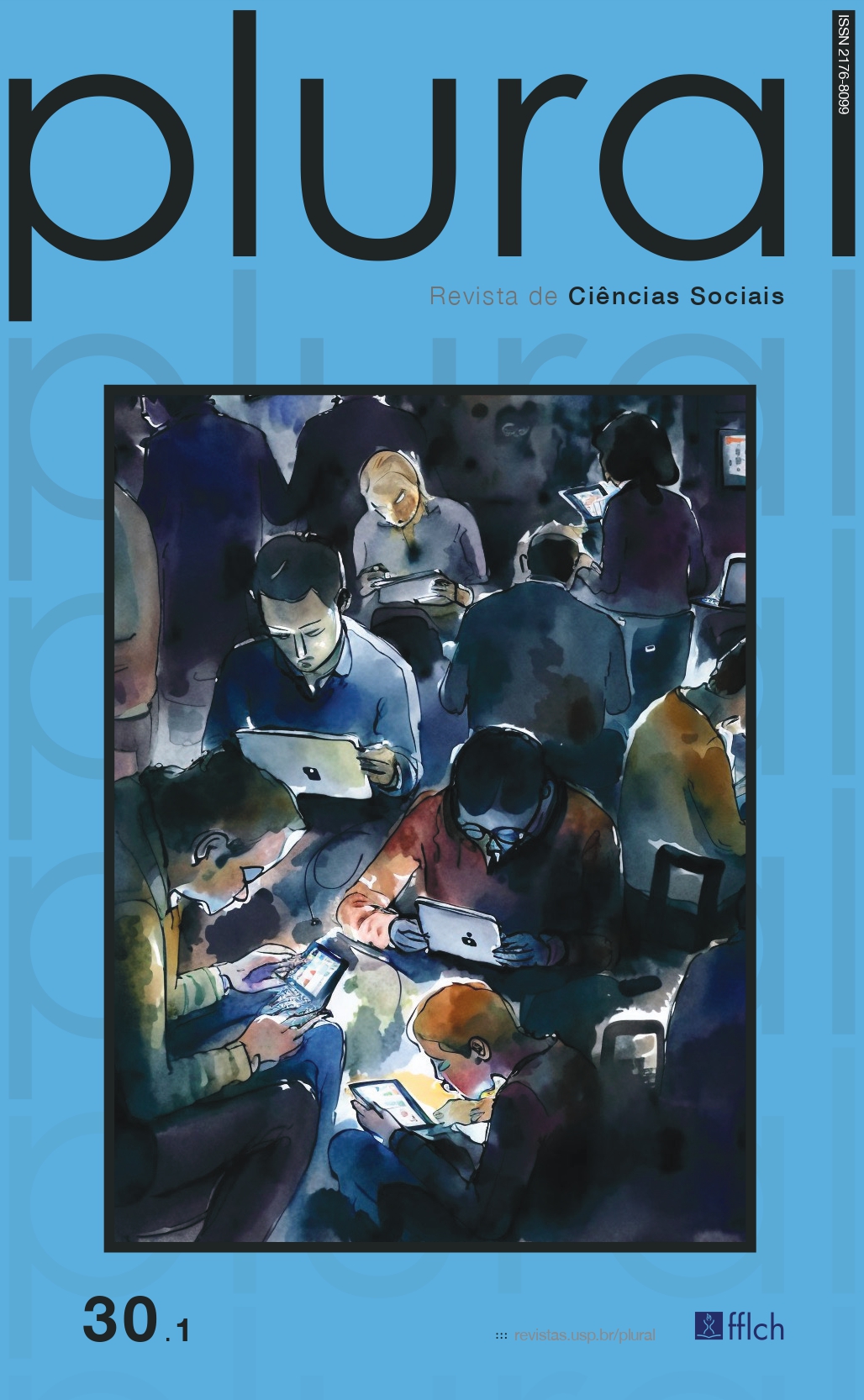Como surgem sociedades divididas?
DOI:
https://doi.org/10.11606/issn.2176-8099.pcso.2023.196765Palavras-chave:
Sociedade dividida, Desigualdade, Dependência assimétrica, Polarização sociocultural, Inclusão e exclusão, EstranhosResumo
O artigo analisa forças divisivas nas sociedades contemporâneas e as conecta às esperanças incumpridas oriundas das revoluções do início da modernidade: as esperanças por igualdade, liberdade e fraternidade/solidariedade. Antes de tudo, no século XXI, podemos dizer que há desigualdades persistentes que emergem em todos os sistemas funcionais da sociedade e tornam-se divisivas assim que eclode uma cisão descontínua na distribuição de ganhos. Cisão esta que torna improvável que alguém se movimente de um lado ao outro da distribuição. Em segundo lugar, há fortes dependências assimétricas vinculadas a um aumento dos controles por parte de pessoas e grupos que controlam recursos desejados por outros; essas dependências, por sua vez, fortalecem o acréscimo dos controles dos primeiros sobre os últimos, seja sobre ações, comunicações, opções de saída e/ou modos de perceber o mundo. Quanto maiores as dimensões de controle presumidas numa relação social dada, mais fortes e pervasivas as dependências assimétricas, as quais separam a sociedade entre aqueles que exercem controles e aqueles que são objeto de controle. Há ainda, em terceiro lugar, como estrutura de divisão, a ascensão da polarização sociocultural. Ela cria uma cisão entre subcomunidades significantes de uma sociedade com base em quais comunidades percebem os membros de outras como perigosos e estranhos aos valores e formas de vida considerados essenciais para a própria comunidade. O artigo explica, por fim, tais divisões societais ao estudá-las como formas de inclusão e exclusão. Desigualdades advêm de acumulação nas dinâmicas de inclusão dos sistemas funcionais; dependências assimétricas emergem em instituições e grupos que absorvem pessoas excluídas de participações relevantes em experiências e cursos de ação; polarizações baseiam-se nas exclusões recíprocas e totalizantes pelas quais comunidades definem membros de outras comunidades como ‘outros’ radicais.
Downloads
Referências
AHLERS, Anna L., Damien Krichewsky, Evelyn Moser, and Rudolf Stichweh. (2020). Democratic and Authoritarian Political Systems in 21st Century World Society. Vol. 1 - Differentiation, Inclusion, Responsiveness. Bielefeld: Transcript.
AUTOR, David H. (2014). "Skills, education, and the rise of earnings inequality among the "other 99 percent". Science 344:843-51.
BANFIELD, Edward C. (1958). The Moral Basis of a Backward Society. New York: Free Press.
BOHN, Cornelia. (2006). Inklusion, Exklusion und die Person. Konstanz: UVK.
BURT, Ronald S. (1992). Structural Holes. The Social Structure of Competition. Cambridge, Mass.: Harvard U.P.
COLEMAN, James S. (1990). Foundations of Social Theory. Cambridge, Mass.: Harvard University Press.
DICKENS, Charles. (1848). Dombey and Son. Oxford: OUP, Oxford World's Classics 2008.
DIPRETE, Thomas A., and Gregory M. Eirich. (2006). "Cumulative Advantage as a Mechanism for Inequality." Annual Review of Sociology 32:271-97.
DURKHEIM, Émile. (1893). De la division du travail social. Paris: P.U.F. 1973.
ELIAS, Norbert. (1976). Über den Prozeß der Zivilisation. Soziogenetische und psychogenetische Untersuchungen. Frankfurt a.M.: Suhrkamp.
GOFFMAN, Erving. (1961). Asyle. Über die soziale Situation psychiatrischer Patienten und anderer Insassen. Frankfurt a.M.: Suhrkamp 1973.
HIRSCHMAN, Albert O. (1970). Exit, Voice and Loyalty. Responses to Decline in Firms, Organizations, and States. Cambridge/Mass.
HOCHSCHILD, Arlie Russell. (2016). Strangers in Their Own Land. Anger and Mourning on the American Right. New York: The New Press.
IFILL, Gwen. (1993). "Clinton's Tightrope; Presidency Takes on Shifting Politics Of U.S. Role in Curbing Violent Crime." in The New York Times. New York.
KANT, Immanuel. (1783). "Beantwortung der Frage: Was ist Aufklärung?" p. 51-61 in Werke Bd. 9, edited by Wilhelm Weischedel. Darmstadt: Wissenschaftliche Buchgesellschaft 1975.
KLEIN, Ezra. (2020). Why We're Polarized. New York: Avid Reader Press.
KLUCKHOHN, Clyde. (1951). "Values and Value Orientations in the Theory of Action: An Exploration in Definition and Classification." Pp. 388-433 in Toward a General Theory of Action, edited by Talcott Parsons and Edward A. Shils. New York: Harper & Row.
LIU, Cixin. (2015 - 2017). The Three-Body Problem (Vol. 1-3). London: Head of Zeus.
LUHMANN, Niklas. (1978). "Erleben und Handeln." p. 67-80 in Soziologische Aufklärung 3, edited by Niklas Luhmann. Opladen: Westdeutscher Verlag 1980.
LUHMANN, Niklas. (1984). Soziale Systeme: Grundriß einer allgemeinen Theorie. Frankfurt a.M.: Suhrkamp.
LUHMANN, Niklas. (1990). "Die Homogenisierung des Anfangs: Zur Ausdifferenzierung der Schulerziehung." p. 73-111 in Zwischen Anfang und Ende: Fragen an die Pädagogik, edited by Niklas Luhmann and Karl Eberhard Schorr. Frankfurt a.M.
MARES, Isabela. (2015). From Open Secrets to Secret Voting. Democratic Electoral Reforms and Voter Autonomy. Cambridge: Cambridge U.P.
MENDELBERG, Tali. (2001). The Race Card. Campaign Strategy, Implicit Messages, and the Norm of Equality. Princeton: Princeton University Press.
MERRY, Sally Engle. (1981). Urban Danger. Life in a Neighborhood of Strangers. Philadelphia: Temple University Press.
MERTON, Robert King. (1988). "The Matthew Effect in Science, II. Cumulative Advantage and the Symbolism of Intellectual Property." ISIS 79:606-23. Merton, Robert King, George G. Reader, and Patricia L. Kendall. (1957). The Student Physician: Introductory Studies in the Sociology of Medical Education. Cambridge/Mass.: Harvard University Press.
MILANOVIC, Branko. (2016). Global Inequality. A New Approach for the Age of Globalization. Cambridge, Mass.: The Belknap Press of Harvard University Press.
NAGOURNEY, Adam. (2020). "1988 rally could help show way for Trump." in The New York Times International Edition.
NELSON, Benjamin. (1969). The Idea of Usury. From Tribal Brotherhood to Universal Otherhood. Chicago: University of Chicago Press.
O'CONNELL DAVIDSON, Julia. (2015). Modern Slavery: The Margins of Freedom. London: Palgrave Macmillan.
OECD. (2011). "Education at a Glance. OECD Indicators." in http://dx.doi.org/10.1787/eag-2011-en: OECD Publishing.
OESTREICH, Gerhard. (1980). Strukturprobleme der frühen Neuzeit. Berlin: Duncker & Humblot. Ozouf, Mona. (1997). "Liberté, égalité, fraternité." p. 4353-88 in Les Lieux de mémoire, edited by Pierre Nora. Paris: Gallimard.
Roberts, John. 2015. Freedom as Marronage. Chicago: University of Chicago Press.
SCHLÖGL, Rudolf. (2014). Anwesende und Abwesende. Grundriss für eine Gesellschaftsgeschichte der frühen Neuzeit. Konstanz: Konstanz University Press.
STICHWEH, Rudolf. (1997). "Inklusion/Exklusion, funktionale Differenzierung und die Theorie der Weltgesellschaft." Soziale Systeme 3:123-36.
STICHWEH, Rudolf. (2007). "The Eigenstructures of World Society and the Regional Cultures of the World." p. 133-49 in Frontiers of Globalization Research: Theoretical and Methodological Approaches, edited by Ino Rossi. New York: Springer.
STICHWEH, Rudolf. (2008). "Professionen in einer funktional differenzierten Gesellschaft." p. 329-44 in Moderne Mythen der Medizin. Studien zur organisierten Krankenbehandlung, edited by Irmhild Saake and Werner Vogd. Wiesbaden: VS Verlag.
STICHWEH, Rudolf. (2009). "Leitgesichtspunkte einer Soziologie der Inklusion und Exklusion." p. 29-42 in Inklusion und Exklusion. Analysen zur Sozialstruktur und sozialen Ungleichheit, edited by Rudolf Stichweh and Paul Windolf. Wiesbaden: VS Verlag für Sozialwissenschaften.
STICHWEH, Rudolf. (2010). Der Fremde. Studien zu Soziologie und Sozialgeschichte. Berlin: Suhrkamp.
STICHWEH, Rudolf. (2013). "The History and Systematics of Functional Differentiation in Sociology." p. 50-70 in Bringing Sociology to International Relations. World Politics as Differentiation Theory, edited by Mathias Albert, Barry Buzan, and Michael Zürn. Cambridge: Cambridge U.P.
STICHWEH, Rudolf. (2016). Inklusion und Exklusion. Studien zur Gesellschaftstheorie. Bielefeld: Transcript.
STICHWEH, Rudolf. (2017). "Gibt es Fremde der Weltgesellschaft? Der Fremde und die soziokulturelle Evolution des Gesellschaftssystems." p. 245-53 in Europa Neu Denken, Bd. 4, edited by Ilse Fischer and Johannes Hahn. Salzburg: Anton Pustet.
Publicado
Edição
Seção
Licença
Copyright (c) 2023 Política de direitos compartilhados

Este trabalho está licenciado sob uma licença Creative Commons Attribution-NonCommercial-ShareAlike 4.0 International License.
Ao submeter seu trabalho à Plural, o autor concorda que: o envio de originais à revista implica autorização para publicação e divulgação, ficando acordado que não serão pagos direitos autorais de nenhuma espécie. Uma vez publicados os textos, a Plural se reserva todos os direitos autorais, inclusive os de tradução, permitindo sua posterior reprodução como transcrição e com devida citação de fonte. O conteúdo do periódico será disponibilizado com licença livre, Creative Commons - Atribuição NãoComercial- CompartilhaIgual –, o que quer dizer que os artigos podem ser adaptados, copiados e distribuídos, desde que o autor seja citado, que não se faça uso comercial da obra em questão e que sejam distribuídos sob a mesma licença (ver: http://www.creativecommons.org.br/).Dados de financiamento
-
Fundação de Amparo à Pesquisa do Estado de São Paulo
Números do Financiamento 2021/02568-0;2021/12742-8








